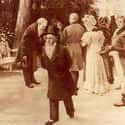-
(#2) His Tutor, Tobias Pfeiffer, Was A Weirdo Who Made Him Practice In The Middle Of The Night
In 1779, when Beethoven was nine years, an eccentric musician named Tobias Friedrich Pfeiffer moved into the Beethoven household. Pfeiffer had recently moved to Bonn and befriended Ludwig's father, who thought Ludwig could benefit from Pfeiffer's tutelage.
Pfeiffer taught Beethoven for one year, during which time he recognized Ludwig's talent and helped him improve greatly as a musician. However, he was apparently a very disagreeable man with a habit of forcing Ludwig to practice at strange hours. According to some sources, Pfeiffer was an insomniac, and would drag Beethoven out of bed in the middle of the night for lessons.
Beethoven biographer Tilman Skowroneck argues Pfeiffer was a positive influence on Ludwig the musician and composer, despite the negative effects he had on the young boy's psyche. According to primary sources Skowroneck cites, Pfeiffer was a gifted musician and the primary source of Beethoven's formal musical education as a child.
-
(#8) He Never Married, But Not For Lack Of Trying
Ludwig van Beethoven never married. He proposed marriage to several women, though was rejected by all of them. Among other reasons for these rejections was his physical appearance. Countess Julia Guicciardi, a piano pupil in her teens and the object of the Sonata No. 14 in C-Sharp Minor (Moonlight), described Beethoven as "very ugly, but noble..." Yeah, sure, musical genius. But dag, so fugly.
Of course, looks aren't everything. Beethoven was also arrogant and unpleasant. In 1810, he was romancing Therese Malfatti, long-rumored to be the inspiration for Beethoven's Bagatelle No. 25 in A minor (Fur Elise). As things heated up between them, Beethoven contemplated a marriage proposal, but was banned from the Malfatti household for offending everyone in it.
There also was the matter of social class. Beethoven circulated in high society, so he was exposed to woman with titles and wealth. Even though he achieved great success, he was a musician and, therefore, in the early 19th century, still thought of as a veritable servant.
-
(#12) He Stopped Performing Publicly After Bungling His Own Piece Because Of His Hearing Loss
In the early days of his career, Beethoven was known as a skilled concert pianist with a remarkable talent for improvisation. Because live performances were lucrative, he attempted to play in front of a paying crowd well after he had lost much of his hearing. A failed attempt to play his Piano Concerto No.5 (Emperor) in 1811 was the last time he performed in public.
Though he never performed publicly after that, he appeared on stage for the premiere of his Ninth Symphony in Vienna on May 7, 1824.
-
(#6) He Was A Slob, Dressed Poorly, And Was Difficult Very To Get Along With
Beethoven's personality, comportment, and hygiene left a lot to be desired, judging from some of the quotes about him. "As a young man, Beethoven was frank to the point of rudeness. Headstrong and proud, he was never willing to conform in his behaviour..."
Of course, being desperately alone and beaten by your alcoholic father for much of your childhood might do that to you. Another revealing comment came from a visitor to Beethoven's home:
"Picture to yourself the dirtiest, most disorderly place imaginable - blotches of moisture covered the ceiling, an oldish grand piano, on which dust disputed the place with various pieces of engraved and manuscript music; under the piano (I do not exaggerate) an unemptied pot de nuit; ... the chairs, mostly cane-seated, were covered with plates bearing the remains of last night's supper and with wearing apparel etc."
Beethoven seems anything but a smooth sophisticate:
"Beethoven was most awkward and bungling in his behaviour; his clumsy movements lacked all grace. He rarely picked up anything without dropping or breaking it... Everything was knocked over, soiled, or destroyed. How he ever managed to shave himself at all remains difficult to understand, even considering the frequent cuts on his cheeks. - He never learned to dance in time with the music."
-
(#14) His Disdain For Authority And Pretense Ruined His View Of A Literary Hero
Beethoven was naturally predisposed to resisting authority. Like many of his generation, he was ideologically influenced by the French Revolution. He hated being told what to do and disdained all forms of social pretense or hierarchy. If asked to perform at a social gathering, he would resolutely refuse and, in some cases, storm out. His refusal to follow the norms of bourgeoisie and aristocratic etiquette was so profound, Archduke Rudolph, a patron of the arts and supporter of Beethoven, exempted him from the rules of the court.
This stubbornness also applied to Beethoven's conception of himself as an artist, and his ideas of the role of the artist in society. In his mind, the artist stood apart from all others, a special class of people endowed with special gifts. He dubbed himself a Tondichter ("poet of sound") and accorded the same respect and status to fellow artists. His image of artists worked against him in some instances, though. When Beethoven met Johann Wolfgang von Goethe, who he esteemed as the greatest of poets, he was disturbed to see the writer behaving deferentially with royals. This ruined his conception of Goethe.
-
(#15) For A Change of Pace, The Premiere Of Beethoven's Ninth Was Remarkably Poignant
In 1824, Beethoven wished to premiere his Symphony No. 9 in D minor, Op. 125 (Choral) in Berlin. He felt Vienna had become more hospitable to Italian composers, and his style of music would be more appealing elsewhere. He relented when a petition signed by fellow musicians and arts patrons urged him to change his mind. The premiere was set for May 7, 1824.
The performance was set to be Beethoven's first stage appearance in more than a decade, and would require the largest orchestra yet assembled by the composer. It was also one of the longest, most complex symphonies yet written, and the only symphony by a major composer to incorporate vocal work. While Beethoven was officially the conductor, another conductor, Michael Umlauf, was also on stage. It's believed the musicians were instructed to ignore Beethoven. According to one of the musicians in the orchestra:
“...he stood in front of the conductor’s stand and threw himself back and forth like a madman. At one moment he stretched to his full height, at the next he crouched down to the floor. He flailed about with his hands and feet as though he wanted to play all the instruments and sing all the chorus parts.”
There are many anecdotes about the performance, most probably apocryphal, but there is no question the piece was a tremendous success. As the final notes faded from the air, Beethoven was focused on the orchestra and unable to hear the tumultuous applause. A member of the chorus turned him around so he could observe the jubilation. The were five separate ovations, and waving hats and handkerchiefs and a sea of raised hands were on display to ensure the composer knew how much the audience loved his work.
New Random Displays Display All By Ranking
About This Tool
Beethoven has been away for more than 200 years, almost everyone in the world knows his name and music. All the modern musicians are still fascinated by his beautiful music and touching melody, but few people know how tragic his life has been. Beethoven spent his childhood under the strict and demanding education of his father, which created his stubborn, sensitive personality. When his music career began to develop, he was hit by fate again, he was deaf.
He has almost never heard of his own work. After his deafness, he tried his best to avoid any social activities. If a musician cannot hear his own work, what could be more cruel torture? The random tool shares 18 sad facts about the miserable life of Beethoven.
Our data comes from Ranker, If you want to participate in the ranking of items displayed on this page, please click here.
















